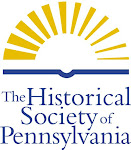In this letter, Mr. Penn's hysteria rises to a boiling point, and he writes to Benjamin Chew, "Your great friendship towards me has been the cause of my death an event which has not yet taken place as you will see, but I hear it will not be long ere it happens. I have been so much vexed perplexed and disappointed in your not enabling Mr. Coates to put in bail for me....I am told this business of attachment might easily have been prevented at the beginning; that was not done and therefore I must suffer."


In the letter following this, Mr. Penn begins to Benjamin Chew, "I am sorry any thing I should have written to you caused any pain to your feelings. I certainly never meant it. You must attribute it to my distress which accumulates every day....For God's sake, do every thing you can to extricate me + if the Francis family will have the Luzerne lands they must in short, I am almost bewildered + I know not what I write, documents, I have none to send...."
Some bewilderment, indeed! There is a very similar kind of exchange between Mary Penn and Benjamin Chew in 1812, a year after Richard Penn's death. Mrs. Penn appointed another attorney to represent her, and then apologized to Benjamin Chew for hurting his feelings, explaining that she did what was necessary, and hoped that it would not hurt their friendship.













